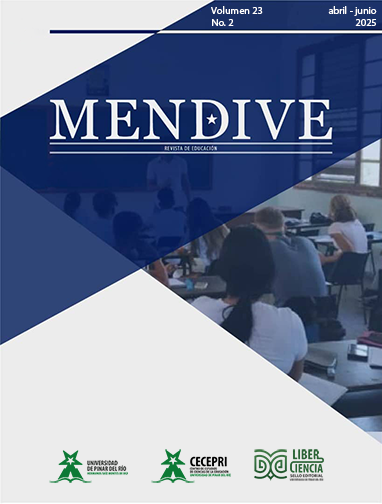Analysis of the effect of microlearning on the academic performance of students at the "Edwin Mendoza" Educational Unit
Main Article Content
Abstract
The research was conducted at the "Edwin Mendoza" Educational Unit, where problems in students' academic performance were detected. The objective of this study was to present an analysis of the effect of microlearning on the academic performance of ninth-grade students. The methodology used in this study was quantitative, with an experimental design. Microlearning was implemented through brief interactive online sessions focused on specific topics and adapted to each student's learning pace. These sessions included short videos, gamification activities, and immediate feedback questionnaires. The process was coordinated as follows: first, the instruments to be administered were designed and developed. Once these were developed, the initial survey was administered. Interactive online sessions were then prepared to be administered through microlearning sessions for the experimental group. The control group followed the traditional curriculum. The results revealed that students who participated in the microlearning program showed a significant increase in their academic grades compared to the control group. Participants also reported greater satisfaction and engagement with learning activities compared to traditional methods. In conclusion, the study supported the effectiveness of microlearning as an innovative pedagogical strategy to improve academic performance, knowledge retention, and student motivation in educational settings such as the "Edwin Mendoza" Educational Unit.
Downloads
Article Details

This work is licensed under a Creative Commons Attribution-NonCommercial 4.0 International License.
References
Capuno, R., Necesario, R., Etcuban, J. O., Espina, R., Padillo, G., & Manguilimotan, R. (2019). Attitudes, Study Habits, and Academic Performance of Junior High School Students in Mathematics. International Electronic Journal of Mathematics Education, 14(3). https://doi.org/10.29333/iejme/5768
Chong González, E. G. (2017). Factores que inciden en el rendimiento académico de los estudiantes de la Universidad Politécnica del Valle de Toluca. 47(1), 91-108. https://ri.ibero.mx/bitstream/handle/ibero/4886/RLEE_47_01_91.pdf?sequence=1&isAllowed=y
Corbeil, J. R., Khan, B. H., & Corbeil, M. E. (2021). Microlearning in the Digital Age: The Design and Delivery of Learning in Snippets (J. R. Corbeil, B. H. Khan, & M. E. Corbeil, Eds.; 1.a ed.). Routledge. https://doi.org/10.4324/9780367821623
Eakman, A. M., Kinney, A. R., Schierl, M. L., & Henry, K. L. (2019). Academic performance in student service members/veterans: Effects of instructor autonomy support, academic self-efficacy and academic problems. Educational Psychology, 39(8), 1005-1026. https://doi.org/10.1080/01443410.2019.1605048
Estrada García, A. (2018). Estilos de aprendizaje y rendimiento académico. Revista Boletín Redipe, 7(7).
Jo Dolasinski, M., & Reynolds, J. (2023). Microlearning in the Higher Education Hospitality Classroom. Journal of Hospitality and Tourism Education, 35(2), 133-142.
Kapp, K. M., & Defelice, R. A. (2019). Microlearning: Short and Sweet. Association for Talent Development.
Martínez, V., & Otero, V. (2007). Los adolescentes ante el estudio. Causas y consecuencias del rendimiento académico. Madrid: Fundamentos.
Merchán Zambrano, D. K. (2024). La innovación educativa en el proceso de enseñanza de los docentes. La Libertad: Universidad Estatal Península de Santa Elena.
OECD. (2019). PISA 2018 Assessment and analytical framework. https://doi.org/10.1787/b25efab8-en
Prieto Andreu, J. M., Gómez Escalonilla-Torrijos, J. D., & Said Hung, E. (2022). Gamificación, motivación y rendimiento en educación: Una revisión sistemática. Revista Electrónica Educare, 26(1), 251-273. https://doi.org/10.15359/ree.26-1.14
Reimers, F., & Schleicher, A. (2020). Schooling disrupted, schooling rethought. How the Covid-19 pandemic is changing education. OECD.
Serna, S. (2016). Diseño de interfaces en aplicaciones móviles. Editorial RA-MA. https://www.digitaliapublishing.com/a/110072/diseno-de-interfaces-en-aplicaciones-moviles
Schleicher, A. (2018). PISA 2018: perspectivas e interpretaciones. OECD Publishing.
Trabaldo, S., Mendizábal, V., & González Rozada, M. (2017). Microlearning: Experiencias reales de aprendizaje personalizado, rápido y ubicuo. IV Jornadas de TIC e Innovación en el Aula, La Plata. http://sedici.unlp.edu.ar/handle/10915/65550
Villarruel Meythaler, R. E., Tapia Morales, K. I., & Cárdenas García, J. K. (2020). Determinantes del rendimiento académico de la educación media en Ecuador. Revista Economía y Política, 32, 173-190. https://doi.org/10.25097/rep.n32.2020.08


